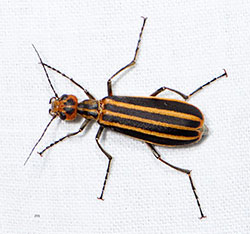NC Issues Stop-Sale Order on Alfalfa Hay Possibly Contaminated with Blister Beetles
North Carolina Dept. of Agriculture and Consumer Services
RALEIGH – State officials issued a stop-sale order Monday on alfalfa hay received from Kansas and being sold at Murphy Farm Hay and Feed in Louisburg and Jones Farm Hay and Feed in Middlesex for blister beetle contamination, which can be deadly for horses.
Store owners voluntarily recalled the alfalfa hay when they learned about the possible contamination and are cooperating with feed inspectors from the N.C. Department of Agriculture and Consumer Services to notify any animal owners who may have purchased the alfalfa hay. The hay was delivered from Kansas and sold at the stores during recent weeks.
“Department feed inspectors are conducting tracebacks to determine whether any other feed stores received alfalfa hay from the same source in Kansas,” said Agriculture Commissioner Steve Troxler. “While the investigation into this case is ongoing, we wanted to alert animal owners, especially those in the equine community, to this situation.”
Five horse deaths have been attributed to blister beetle poisoning. All five were fed the alfalfa hay that originated in Kansas and was either sold by Murphy Farm Hay and Feed or distributed by Murphy to Jones Farm Hay and Feed. Kansas agriculture officials have not reported a spike in blister beetle toxicity.
Animal owners who bought alfalfa hay from Murphy Farm Hay and Feed or Jones Farm Hay and Feed are encouraged to stop using it immediately and return it to the location where purchased.
Blister beetles contain a poisonous substance called cantharidin. Cattle, goats, sheep and horses may be affected, with horses being more affected by the toxin than ruminants. Feed affected by the toxin may or may not have visible beetles in it. Horse owners should monitor their animals and contact their veterinarian if any of these signs are observed: inflammation, colic, straining, elevated temperature, depression, blood in the urine, increased heart rate and respiration, dehydration, sweating, diarrhea and death.











